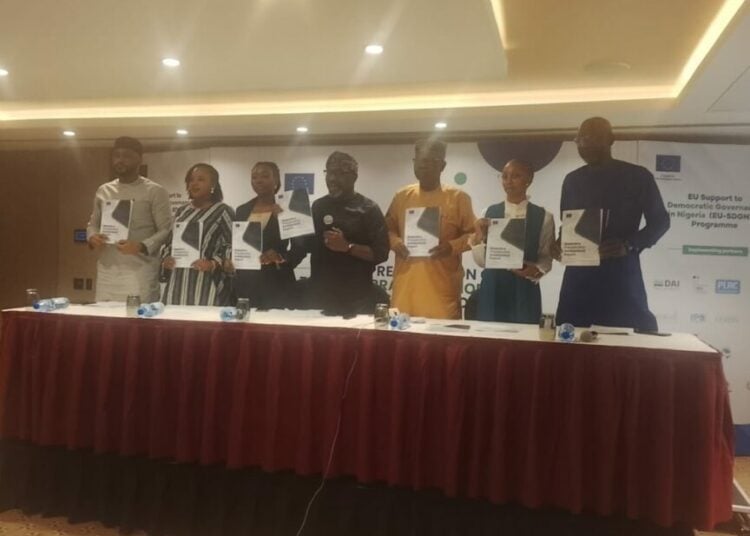The European Union Support to Democratic Governance in Nigeria Phase II (EU-SDGN II) implementing partners have urged the Independent National Electoral Commission (INEC), the Nigeria Police, and the Economic and Financial Crimes Commission (EFCC) to enforce strict penalties against vote-buying and other electoral offences ahead of the 2025 Anambra State off-cycle governorship election.
The Executive Director of the International Press Centre (IPC), Mr. Lanre Arogundade, stated this while briefing the media on behalf of 16 civil society organisations (CSOs) at the public presentation of the Anambra Governorship Pre-Election Assessment Report in Abuja on Thursday.
The governorship election is scheduled for Saturday, November 8, 2025.
Arogundade said, “Enforcing penalties for vote-buying and other electoral crimes is central to restoring citizens’ confidence in Nigeria’s elections.
“We call on INEC, security agencies, and the EFCC to be proactive in detecting and apprehending offenders during campaigns and on election day.”
The pre-election report, which covers developments between June and September 2025, was conducted under the EU-SDGN II’s six-component framework supporting INEC, the National Assembly, Judiciary, political parties, the media, women, youth, persons with disabilities (PWDs), and civil society.
It also assessed the preparedness of key stakeholders and the overall electoral environment in Anambra State ahead of the November 8 poll.
According to its findings, Anambra’s political atmosphere remained highly competitive, with the All Progressives Grand Alliance (APGA), the Peoples Democratic Party (PDP), the All Progressives Congress (APC), and the Labour Party (LP) emerging as major contenders.
However, the report flagged concerns over insecurity, the misuse of vigilante groups, and the fragility of electoral infrastructure, especially following incidents of violence during the recent August 2025 by-election.
The representatives of the partner organisations under the EU-supported programme said credible and peaceful elections require decisive action from all institutions responsible for electoral justice and enforcement.
The implementing partners are DAI Global Belgium SRL; International Institute for Democracy and Electoral Assistance (International IDEA); the Youth Initiative for Advocacy, Growth and Advancement Africa (YIAGA Africa); Policy and Legal Advocacy Centre (PLAC); the Kukah Centre; International Press Centre (IPC).
Others are; Centre for Media and Society (CEMESO); the Albino Foundation Africa (TAF Africa); Nigerian Women Trust Fund (NWTF); ElectHER; SOS Children’s Villages; Civil Society Legislative Advocacy Centre (CISLAC); Corporate Accountability and Public Participation for Africa (CAPPA); Justice, Development and Peace Makers’ Centre, Osogbo; Justice Development and Peace Initiative, Ekiti; and Justice, Development and Peace Movement.
They warned that persistent voter apathy, vote-buying, and insecurity continued to threaten electoral integrity in Anambra State, calling on the relevant agencies to demonstrate the political will to deter offenders.
The EU-SDGN partners noted that voter turnout in the 2021 governorship election stood at a record low of 10.2 per cent, the lowest in Nigeria’s electoral history, warning that unless urgent steps were taken to address voter apathy and voter inducement, participation in 2025 could decline further.
“In a state with a proud political culture and a history of active civic engagement, voter apathy and the monetisation of the process are troubling. Democracy cannot thrive where votes are bought and citizens feel their choices no longer matter,” the report emphasised.
The assessment further identified insecurity as a major threat to voter participation, with reports of cult-related violence, kidnappings, and disinformation campaigns creating fear and distrust among voters. It highlighted gaps in security coordination, noting that restricted movement and intimidation could undermine the credibility of the election if not addressed.
To ensure a safe and inclusive election, the partners recommended exclusion of non-statutory security outfits, such as vigilantes, from election duties, while reinforcing the neutrality and professionalism of the police and other security personnel. They also urged the deployment of well-trained, impartial officers across volatile local government areas.
The report commended INEC for its improved registration process, which recorded over 168,000 newly registered voters, mostly women and young people. However, it raised concerns over persistent operational and logistical lapses, including delayed opening of polling units, malfunctioning of the Bimodal Voter Accreditation System (BVAS), and limited accessibility for persons with disabilities.
The EU-SDGN partners also called on the electoral body to strengthen its logistics chain, ensure timely delivery of election materials, and deploy adequately trained officials to forestall disruptions. “Transition plans must translate into field efficiency. Elections must begin on time, equipment must work, and no voter should be disenfranchised,” they added.
The assessment noted that journalists covering election-related activities in Anambra have faced harassment, intimidation, and restricted access, particularly in high-risk areas.
To mitigate this, the partners recommended the establishment of a Media-Security Desk at the state level, with clear communication channels to ensure accredited reporters can safely access polling units and collation centres.
On gender participation, the EU-SDGN report acknowledged Anambra’s history of women’s leadership but lamented the low representation of women in the forthcoming election, with only two female governorship candidates among 16 political parties. It also observed that media coverage remains largely gender-blind, while female politicians continue to face online abuse and discriminatory party structures.
The group urged INEC to strengthen its Gender Desk Officers at the state and local government levels and ensure that at least one female electoral official is deployed per polling unit. It also called for gender-disaggregated data on voter registration, accreditation, turnout, and candidacy to promote transparency and evidence-based advocacy.
Similarly, the assessment found that while 86 per cent of persons with disabilities (PWDs) have collected their permanent voter cards, polling stations across the state remain largely inaccessible. It recommended that INEC audit and upgrade polling and registration centres to include ramps, tactile paths, lowered tables, and assistive tools such as braille guides, magnifiers, and sign-language interpreters.
In their recommendations, the EU-SDGN partners underscored the need for stronger enforcement of electoral laws, improved coordination among security agencies, and enhanced voter education campaigns to discourage vote-buying and misinformation. They emphasised that the credibility of the Anambra election will not be judged merely by the votes counted but by the inclusivity and safety of the process.
“The credibility of this election will be measured not only by how many votes are counted, but by all who wish to vote and are enabled to vote. Anambra has an opportunity to demonstrate that democracy in Nigeria can be credible, inclusive, and transparent. Promises must now become tangible results,” the partners stated.
The EU-SDGN II programme, funded by the European Union, brings together sixteen civil society organisations to advance democratic governance in Nigeria. Through evidence-based monitoring, advocacy, and technical support, the partners aim to strengthen institutions, promote accountability, and ensure that elections reflect the genuine will of the people.





